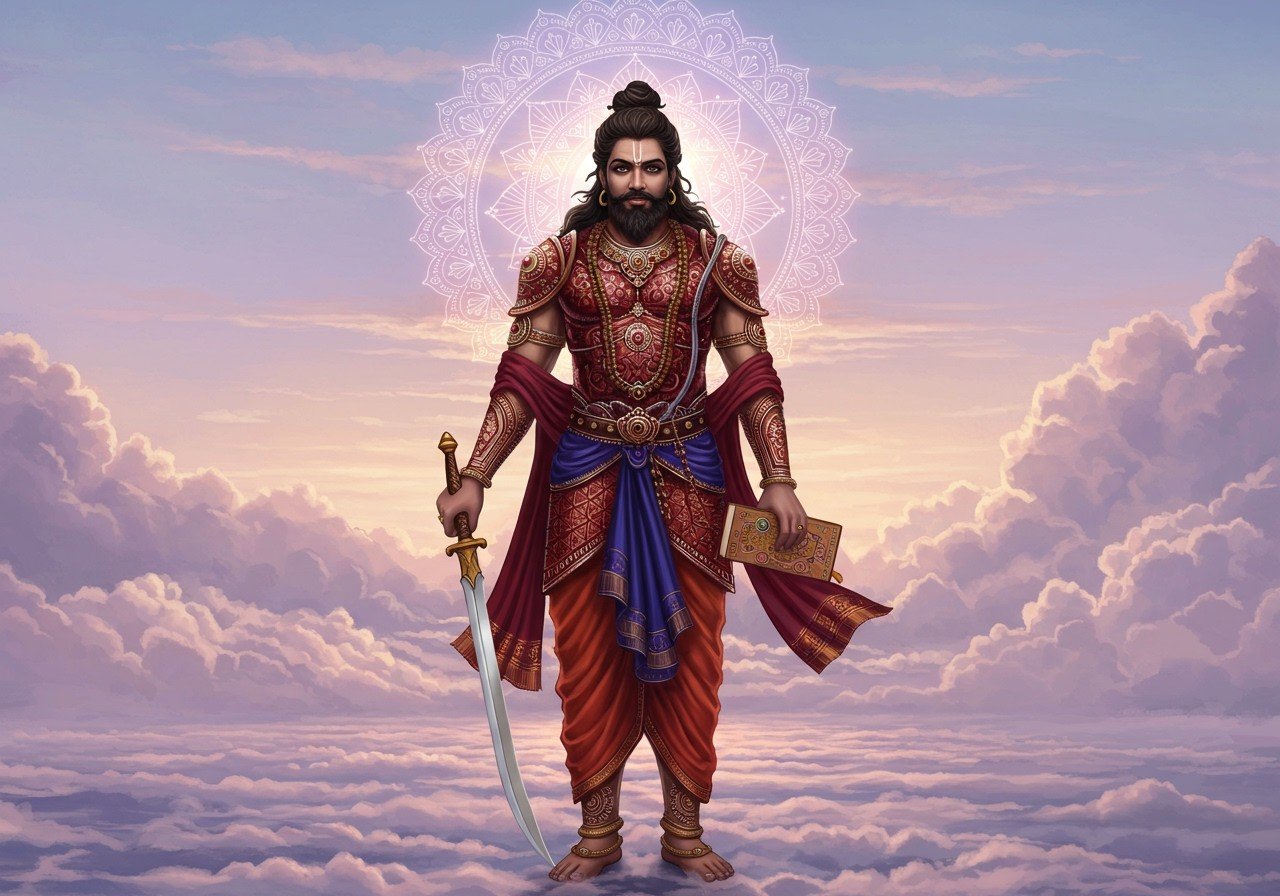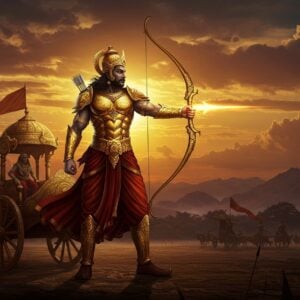
In the grand tapestry of the Mahabharata, Sahadeva, the youngest Pandava, shines brightly with his profound wisdom and strategic thinking. His name, meaning “with the gods,” reflects his divine connection and noble character. Let’s journey through the cultural landscapes of India and explore how different regions perceive and celebrate this remarkable figure. Discover the depth of his wisdom and his enduring legacy that continues to inspire us today.
Sahadeva’s Wisdom in Kannada Culture
In Karnataka, the land of rich traditions, Sahadeva is revered as a beacon of wisdom and humility. Kannada literature and folklore beautifully portray his devotion and insightful nature. The vibrant Yakshagana performances bring his strategic brilliance to life, captivating audiences with his astute decisions. During festivals, the people of Karnataka honor Sahadeva, recognizing his foresight and intellect. His influence extends even to modern Kannada media, showcasing the timeless relevance of his character.
You can explore our diverse collection of Puja samagri to enhance your spiritual practices.
Sahadeva’s Strength in Hindi Culture
In the heartland of India, where Hindi is spoken, Sahadeva embodies divine strength and moral integrity. Hindi literature celebrates his intellectual prowess and unwavering righteousness. During pivotal events like the Rajasuya Yajna, his strategic contributions were invaluable to the Pandavas’ triumph. Sahadeva’s wisdom echoes through Hindi poetry and songs, a testament to his revered status in the cultural consciousness.
Poojn.in offers a wide selection of holy books, including the Mahabharata, to deepen your understanding of these timeless stories.
Sahadeva’s Introspection in Bengali Culture
Bengal, with its artistic spirit, embraces Sahadeva as a symbol of introspection and calmness. His name, resonating with divine wisdom, is deeply respected in Bengali culture. Bengali adaptations of the Mahabharata delve into his philosophical insights, revealing his profound understanding of life’s complexities. Poets and authors in Bengal often highlight his thoughtful nature and the significant contributions he made to the Pandavas’ cause. Sahadeva’s legacy continues to inspire Bengali festivals and rituals, weaving seamlessly into the fabric of contemporary culture.
Enhance your spiritual journey with our collection of culturally significant items, carefully curated to honor diverse traditions.
Sahadeva’s Pivotal Role in the Mahabharata
Sahadeva’s role in the Mahabharata is paramount, his strategic thinking and diplomatic skills proving crucial time and again. His unwavering loyalty to Yudhishthira and his brothers is a testament to his noble character. During the epic Kurukshetra War, his predictions and wise counsel were instrumental in shaping the course of events. As a trusted advisor, Sahadeva contributed significantly to the Pandavas’ eventual victory, showcasing his wisdom and foresight.
Looking for auspicious items for your puja? Check out our wide range of Puja Kits designed for various occasions and deities.
Sahadeva’s Varied Interpretations and Enduring Legacy
Across the diverse regions of India, Sahadeva’s portrayal varies, reflecting the richness of regional folklore and traditions. Yet, the common threads of wisdom, strategic thinking, and unwavering righteousness remain constant. His impact is evident in Indian art, literature, and popular culture, highlighting his enduring presence in our collective consciousness. Sahadeva’s legacy continues to inspire values of wisdom and righteousness in today’s world, making him a truly timeless figure. He stands as a reminder of the power of intellect, loyalty, and devotion to dharma.
Explore a diverse collection of spiritual and cultural products at Poojn.in, your one-stop shop for all your puja needs.
Delving Deeper into Sahadeva’s Life
- Meaning and Etymology: Sahadeva’s name is a combination of “saha” (with) and “deva” (deity), meaning “with the gods.” This signifies his divine connection and noble qualities. An alternate interpretation, “possessing twin horses”, symbolizes strength and nobility, further enriching his character.
- Cultural Significance: Recognized for wisdom and diplomacy, Sahadeva’s intellect was compared to Brihaspati, the teacher of the gods. His astrological knowledge was profound, particularly in South India. He held secrets close, understanding situations deeply but revealing little. In warfare, he was a skilled swordsman.
- Alternate Names: Known as Tantripala during his exile as a cowherd and Jayadbala amongst his family, Sahadeva’s different names reflect his adaptability and resourcefulness.
- Family Lineage: Son of Madri and the Ashwini Kumaras, twin brother of Nakula, and husband to Draupadi and Vijaya, Sahadeva’s family connections are deeply intertwined with the Mahabharata’s narrative. His sons, Shrutasena and Suhotra, carry forward his legacy.
Frequently Asked Questions About Sahadeva
What makes Sahadeva such a captivating figure? He possessed remarkable astrological prowess, supposedly foreseeing the Mahabharata war. Yet, he remained silent, bound by an oath. His wisdom was renowned, earning him comparisons to Brihaspati, the guru of the gods.
How did Sahadeva contribute to the Pandavas’ cause? He played a crucial role in Yudhishthira’s Rajasuya Yagna, conquering southern kingdoms. He also fulfilled his vow of slaying Shakuni, the mastermind behind the Pandavas’ misfortunes.
Explore a wide selection of culturally significant items at Poojn.in. Contact us at 03369029784 or WhatsApp us at 9476142738 for personalized assistance.


